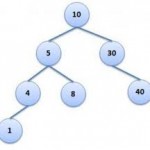Here is a complete C program which prints a BST using both recursion and iteration. The best way to understand these algorithms is to get a pen and a paper and trace out the traversals (with the stack or the queue) alongside. Dont even try to memorize these algorithms!
#include <stdio.h>
typedef struct node
{
int value;
struct node *right;
struct node *left;
}mynode;
mynode *root;
add_node(int value);
void postorder(mynode *root);
void inorder(mynode *root);
void preorder(mynode *root);
void iterativePreorder(mynode *root);
void iterativeInorder (mynode *root);
void iterativePostorder(mynode *root);
int main(int argc, char* argv[])
{
root = NULL;
add_node(5);
add_node(1);
add_node(-20);
add_node(100);
add_node(23);
add_node(67);
add_node(13);
printf("\nPreorder (R) : ");
preorder(root);
printf("\nPreorder (I) : ");
iterativePreorder(root);
printf("\n\nPostorder (R) : ");
postorder(root);
printf("\nPostorder (R) : ");
iterativePostorder(root);
printf("\n\nInorder (R) : ");
inorder(root);
printf("\nInorder (I) : ");
iterativeInorder(root);
}
// Function to add a new node to the BST
add_node(int value)
{
mynode *prev, *cur, *temp;
temp = (mynode *) malloc(sizeof(mynode));
temp->value = value;
temp->right = NULL;
temp->left = NULL;
if(root==NULL)
{
printf("\nCreating the root..\n");
root = temp;
return;
}
prev=NULL;
cur=root;
while(cur!=NULL)
{
prev=cur;
cur=(value<cur->value)?cur->left:cur->right;
}
if(value < prev->value)
prev->left=temp;
else
prev->right=temp;
}
// Recursive Preorder
void preorder(mynode *root)
{
if(root)
{
printf("[%d] ", root->value);
preorder(root->left);
preorder(root->right);
}
}
// Iterative Preorder
void iterativePreorder(mynode *root)
{
mynode *save[100];
int top = 0;
if (root == NULL)
{
return;
}
save[top++] = root;
while (top != 0)
{
root = save[--top];
printf("[%d] ", root->value);
if (root->right != NULL)
save[top++] = root->right;
if (root->left != NULL)
save[top++] = root->left;
}
}
// Recursive Postorder
void postorder(mynode *root)
{
if(root)
{
postorder(root->left);
postorder(root->right);
printf("[%d] ", root->value);
}
}
// Iterative Postorder
void iterativePostorder(mynode *root)
{
struct
{
mynode *node;
unsigned vleft :1; // Visited left?
unsigned vright :1; // Visited right?
}save[100];
int top = 0;
save[top++].node = root;
while ( top != 0 )
{
/* Move to the left subtree if present and not visited */
if(root->left != NULL && !save[top].vleft)
{
save[top].vleft = 1;
save[top++].node = root;
root = root->left;
continue;
}
/* Move to the right subtree if present and not visited */
if(root->right != NULL && !save[top].vright )
{
save[top].vright = 1;
save[top++].node = root;
root = root->right;
continue;
}
printf("[%d] ", root->value);
/* Clean up the stack */
save[top].vleft = 0;
save[top].vright = 0;
/* Move up */
root = save[--top].node;
}
}
// Recursive Inorder
void inorder(mynode *root)
{
if(root)
{
inorder(root->left);
printf("[%d] ", root->value);
inorder(root->right);
}
}
// Iterative Inorder..
void iterativeInorder (mynode *root)
{
mynode *save[100];
int top = 0;
while(root != NULL)
{
while (root != NULL)
{
if (root->right != NULL)
{
save[top++] = root->right;
}
save[top++] = root;
root = root->left;
}
root = save[--top];
while(top != 0 && root->right == NULL)
{
printf("[%d] ", root->value);
root = save[--top];
}
printf("[%d] ", root->value);
root = (top != 0) ? save[--top] : (mynode *) NULL;
}
}
And here is the output…
Creating the root..
Preorder (R) : [10] [5] [4] [1] [8] [30] [40]
Preorder (I) : [10] [5] [4] [1] [8] [30] [40]
Postorder (R) : [1] [4] [8] [5] [40] [30] [10]
Postorder (R) : [1] [4] [8] [5] [40] [30] [10]
Inorder (R) : [1] [4] [5] [8] [10] [30] [40]
Inorder (I) : [1] [4] [5] [8] [10] [30] [40]



The following totally iterative program incorporates pre-, in- and post-order DFS traversal altogether:
typedef struct mynode mynode;
struct mynode
{
mynode* childL; // -> left child
mynode* childR; // -> right child
mynode* parent; // -> parent node
int value; // user data
};
void iterativePreInPostOrder(mynode* N)
{
(mynode*) next, save;
if ((next = N) == NULL) return;
save = N->parent;
N->parent = NULL; // fake for stopping the traversal
DL:
/* Try to loop down some left spine, i.e.
all available left (grand)children until there is none. */
N = next;
printf(“pre-order: [%d] “, N->value); // N is in pre-order position
if ((next = N->childL) != NULL)
/* N has a left child */
goto DL;
/* N has no left child. */
printf(“in-order: [%d] “, N->value); // N is in in-order position
if ((next = N->childR) != NULL)
/* N has (no left, but) a right child. */
goto DL;
/* N has no child at all. */
goto UD;
DU: /* N is left child of next. */
N = next; /* N has a left child. */
printf(“in-order: [%d] “, N->value); // N is in in-order position
if ((next = N->childR) != NULL)
/* N has (a left and) a right child. */
goto DL;
/* N has a left child, but no right child. */
UD /* N has no child. */
: /* N has no right child. */
printf(“post-order: [%d] “, N->value); // N is in post-order position
next = N->parent;
UL
:
/* Try to loop up some right spine, i.e.
all available left (grand)parents until there is none. */
if (N == next->childL)
/* N is the left child of next. */
goto DU;
/* N is the right child of next. */
N = next; /* N has a right child. */
printf(“post-order: [%d] “, N->value); // N is in post-order position
if ((next = N->parent)
!= NULL) /* N is not the initial root. */
goto UL;
/* N is the initial root. */
N->parent = save; // restore
return;
}